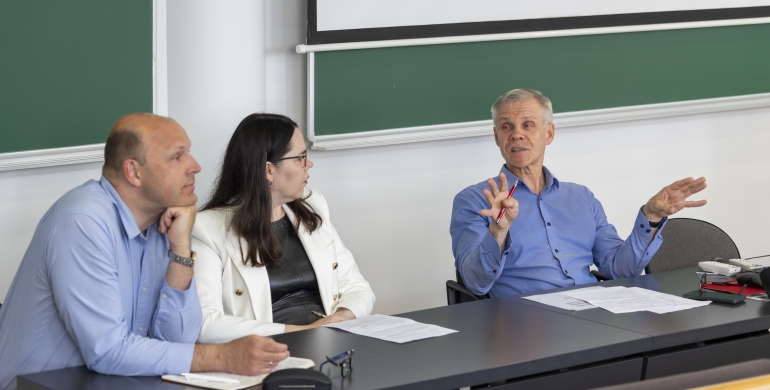Concluding the RGSL international Jean Monnet Summer School “EU Fundamental Values in Times of Crisis”, a prominent panel discussed selected topics of how different types of crises influence EU policies.
The discussants examined what historical events have influenced the crises in Europe. Also, they touched upon the issues related to the 2014 refugee crisis and the 2015-2016 terrorist attacks in Paris and Brussels. The discussants examined the catalysts of these crises and how well the EU has tackled them. As a separate issue, the discussants touched upon the current refugee crisis on the EU border with Belarus. In this case, Lithuania has submitted a claim against Belarus at the International Court of Justice regarding the alleged smuggling of migrants. The legal basis for this is the Protocol against Smuggling of Migrants by Land, Sea and Air, supplementing the United Nations Convention against Transnational Organised Crime of 15 November 2000.
The panel featured Dr.sc.pol. Toms Rostoks, Director of the Centre for Security and Strategic Research, National Defence Academy of Latvia; Dr. hist. Gints Apals, Director of the Public History Division, Museum of Occupation of Latvia; and RGSL Lecturer, PhD candidate Ieva Miļūna.
A great topical debate was carried out on the issues regarding the US President Trump’s policies towards European security. The discussants examined the topic of how much Europe should allow the US President Trump to dictate European military strategies and expenditures. The discussants concluded that the US President Trump’s effect would not be lasting. The discussants also touched upon the fact that Europe has responded to external conflicts – Ukraine and the Middle East. In addition, it was examined why not all Member States of the EU support recognition of the State of Palestine. The discussants concluded that many States, including Latvia, are close allies of the US and Israel and their policies towards Palestine, that being the reason why separate EU countries do not support the recognition of the State of Palestine.
The discussants also touched upon the issue of what the impact of the COVID-19 pandemic was on the agendas of the EU Member States. The following questions were posed: whether Europe is ready to tackle similar situations? Or was multilateralism at its lowest point? The discussants tended to think that multilateralism was strong enough to manage the Covid-19 crisis at the EU level.
What is the future of EU values? To conclude, it was agreed that the EU stands firm on the values of democracy, the rule of law and human rights. Supranationalism cannot always help to solve all the problems faced within the EU. The EU has been active in responding to external conflicts in Ukraine and Palestine. However, the EU was not that well united on the sanctions and rule of law. It was concluded that living in Europe means safety. As Europe is not always the one who is on the stage, the EU should look forward with optimism, welcoming the new Member States such as Moldova, Ukraine and even Canada.
The Summer School took place from 4 to 12 August and was attended by 17 students from four countries – Latvia, Sweden, Finland, and Estonia — and six universities: Riga Graduate School of Law, Lund University, Riga Stradins University, University of Tartu, University of Helsinki, and University of Latvia.
The summer school was organised within Erasmus+ Jean Monnet academic project “EU Fundamental Values in Times of Crisis” (2023-2025).


